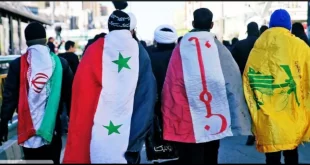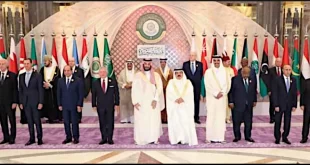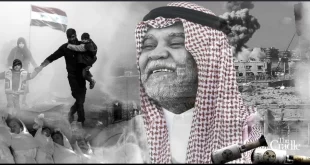Aug 2015, Crescent International
Having failed in their bombing mission, the Najdi Bedouins are using starvation as a tool to subdue the valiant Yemeni people.
While battles continue to rage across Yemen, the Najdi Bedouins in control of the Arabian Peninsula are scrambling for new ways to exert pressure on the Yemeni people. Bombs and massive devastation of the country’s infrastructure have failed to break the resolve and spirit of resistance of the poorest inhabitants of the Muslim East (Middle East). Independent and proud to a fault, Yemenis stubbornly refuse to fall on bended knees to Bani Saud, however low the odds of victory against such a wealthy and brutal regional power.
As Hassan Sufyani, a political analyst in Sana‘a noted, “Yemenis chose to fight tyranny not because they thought they could win but because the alternative would have meant the loss of their honor. There are battles in life we fight not because victory is certain but because it is the right thing to do.” He went on, “There is only so many times a nation can crawl in the dirt and ignore the cries of its people. It was time for the sons of Hamdan to reclaim their land and sovereignty.”
More than four months into this war of attrition, imperial Saudi Arabia has now stooped so low in its rationale of violence and imperious necessity that it has chosen to withhold humanitarian aid for Yemen’s civilians to tame the growing resistance movement against its aggression. According to the UN, nearly 12 million Yemenis are food deficient. An even larger number — 16 million — do not have access to clean drinking water out of a total population of 23 million. This is the direct result of the Najdi Bedouins’ attack on Yemen but to what purpose and what is the Yemenis’ fault: that they refuse to bow to the Najdis’ demented demands?
In complete violation of not only international law but also common human decency, King Salman and his cronies have collectively worked to sabotage UN-organized humanitarian aid to Yemen, thus turning relief into a weapon of war, in the name of their non-existent but loudly proclaimed pride. And if April 17 marked a well publicized and mediatized announcement that Riyadh had secured Yemen a humanitarian lifeline of $274 million, following a UN emergency flash appeal, and as part of its “war relief” program, not a penny or food parcel has reached the brutalized people. If anything, the blockade of its ports has intensified, allowing not a grain of wheat to get through.
The independent media outlet, Vice News, reported in June how Saudi officials leaned on UN officials to sabotage aid delivery, threatening to close the Kingdom’s checkbook should UN agencies refuse to comply with Riyadh’s demands. According to a UN memo it obtained, the media organization asserts the Saudi government has imposed unprecedented conditions on aid agencies, demanding that assistance be limited to Saudi-approved areas and confined to strictly Sunni civilian populations.
While such despicable logic is to be expected from a power that has whipped up sectarianism to sow discord in the Ummah and raise a tyrant through chaos, what of the UN, an institution that claims to be fair and impartial? Its officials prattle about the higher principles they adhere to and claim the organization’s function is to promote peace and harmony in the world. If humanitarian organizations are to be subjected to the vagaries of realpolitik then the world has truly entered a dark chapter of its history and reverted back to organized barbarism.
Still, no Western power has thought of challenging the Najdi Bedouins’ war crimes in Yemen. In a world system where capitalism reigns supreme, the rich and powerful stand above the rule of law. In order to avoid political entanglements, humanitarian organizations tend to shy away from donations that come with strings attached, especially when they fall within the umbrella of the UN Office for Coordination of Humanitarian Affairs (OCHA).
Meant as a supranational institution, OCHA was never intended to be yet another instrument of pressure, legal absolution, or in the case of Yemen, weapon of war. Using aid as both a military tactic and a PR exercise to redeem its atrocious human rights record and somehow try and whitewash its despicable war crimes in Yemen, the Najdi Bedouins are holding the UN hostage to its policies. Such conduct and lobbying tactics of the Najdi Bedouins have led experts to sound the alarm bell. But the train had already left the station.
By late June and amid reports of a worsening humanitarian catastrophe in Yemen, the Saudi regime finally announced that its pledge of $244 million would be divided among nine separate UN agencies. On the heels of this announcement Stephen O’Brien, the UN under-secretary for humanitarian affairs and emergency relief coordinator, sent a letter to the Interagency Standing Committee, a global humanitarian coordinating body that includes UN humanitarian agencies as well as independent NGOs. The letter was attached to a Saudi press release announcing the nine-way cut, explaining how the funds would go through the recently created King Salman Center for Relief and Humanitarian Works (KSC).
“Having agreed to the overall envelopes, however, the KSC would like to negotiate individual Memorandums of Understanding (MoUs) with each recipient agency,” confirmed O’Brien to the press, openly submitting to Riyadh’s bullying tactics.
Interestingly, few media outlets picked up on this Orwellian development! After unilaterally — and let us be frank — illegally declaring war on Yemen, the Saudi regime also wants to dictate how humanitarian relief is to be distributed in the country against which it is engaged in deadly crimes.
A UN aid worker had the following to say, “The UN has punted and handed off the problems to these agencies. I’ve never seen that before.” He added, “The charitable way of saying it is this is a compromise — the less charitable way of saying it is that they folded. It’s really unusual for a single donor to have any substantive role once they contribute funds, let alone negotiate individual MoUs with agencies. What is unprecedented is that the Saudi Kingdom essentially filled up the entire UN flash appeal and are requesting unacceptable terms.”
When quizzed about this very public UN capitulation before Bani Saud’s millions, O’Brien attempted to rationalize the situation by arguing a massive deficit funding gap — in other words, highlighting the UN’s new venal and capitalistic orientation. O’Brien wrote, “With regard to NGOs, I am aware that there are sensitivities in receiving funding directly from the KSC and, therefore, we must work actively to mobilize additional funds to be allocated directly, or via the Pooled Fund, to our front-line partners.”
But that’s only half the story. What O’Brien is not telling us is that by accepting Saudi Arabia’s conditions on aid distribution and aid funding in relation to Yemen, the UN de facto institutionalized aid segregation by allowing humanitarian relief to be made conditional to certain criteria: political affiliation and religious orientation.
With Yemen set as a precedent, who’s to say that a similar set up will not be replicated in other countries in the region: Syria, Iraq, Bahrain, and Libya?
 Syria Support Movement solidarity with the Syrian people
Syria Support Movement solidarity with the Syrian people




